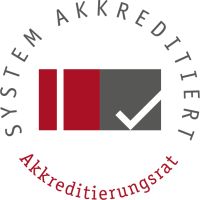Subject of accreditation
The subject of system accreditation is the internal quality assurance system of a state or state-recognised higher education institution in Germany. With system accreditation, a higher education institution receives the right to award the seal of the Accreditation Council for its self-assessed study programmes.
In the course of system accreditation, a higher education institution must demonstrate that it systematically implements the formal and academic criteria laid down in the specimen decree. To this end, the quality management system must provide for regular evaluations of the study programmes and the areas of performance relevant to teaching and learning, involving internal and external students, external academic experts, representatives of professional practice and graduates.
A positive system accreditation certifies that the higher education institution's quality management system in the field of study and teaching is suitable for ensuring that the qualification goals and quality standards of its study programmes are achieved. The higher education institution bears the quality seal of the Accreditation Council.
Review
The system accreditation procedure is a multi-stage process based on the principle of peer review.
If a higher education institution commissions an agency selected by it and approved by the Accreditation Council to carry out a peer review procedure, the agency in question appoints a review panel comprising at least the following persons
- at least three professors with relevant experience in quality assurance of teaching and learning,
- one representative with professional experience,
- one student.
When appointing the review panel, the agency is bound by the procedure developed by the German Rectors' Conference. The professors have the majority of the votes in the panel; the majority of the experts must have experience with system accreditation.
The formal and academic assessment of the quality management system by the expert group is carried out on the basis of the criteria laid down in part 3 of the specimen decree and usually includes two site visits at the higher education institution in addition to the analysis of the application documents. Within the framework of these site visits, the review panel will hold discussions with representatives of the institution. Subsequently, the experts prepare an experts’ report with a recommendation for the accreditation of the higher education institution's internal quality management system.
The evaluation procedure also provides for a random sample in which it is examined whether the intended effects of the quality management system to be evaluated occur at the level of the study programme. The subject of the random sample is the consideration of all criteria according to part 2 and part 3 of the specimen decree within a study programme that has passed through the quality management system of the higher education institution and the consideration of the formal and academic criteria as determined by the review panel.
Decision
The Accreditation Council decides on the accreditation of the quality management system at the request of the higher education institution. The basis for the decision is the experts’ report submitted by the review panel as well as the formal report drawn up by the agency. The formal report shall state in the initial system accreditation that at least one study programme has passed through the quality management system at the time of application. In the case of system re-accreditation, it must be shown that all Bachelor's and Master's programmes have passed through the institution’s internal quality management system at least once.
If the Accreditation Council intends to deviate significantly from the recommendation of the peers, the higher education institution will be given the opportunity to comment before the Accreditation Council's decision.
In the event of a positive accreditation decision, the quality management system bears the quality seal of the Accreditation Council and the higher education institution receives the right to award the seal of the Accreditation Council for the study programmes it has assessed itself.
After completion of the procedure, the Accreditation Council publishes its decision and the accreditation report including the names of the experts in the central database of accredited study programmes and system-accredited universities. Accreditation is granted for a limited period of eight years.
